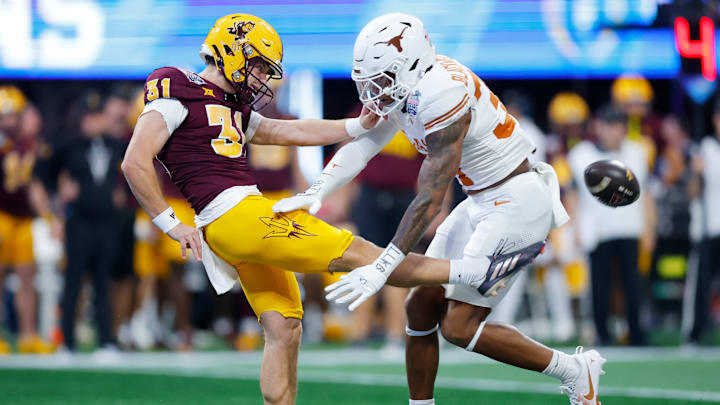Arizona State may have come up short in the College Football Playoff, losing 39-31 in double overtime of the Peach Bowl, but they have plenty to feel good about. Cam Skattebo won the Peach Bowl MVP award, and most of their starters from the game are returning for next year.
As we broke down earlier this week, the offense managed to put up points in bunches despite facing one of the very best defenses in the entire country. Meanwhile, the defense practically shut down Quinn Ewers and this star-studded Longhorns offense for the majority of the game.
So how did they lose?
The Peach Bowl exposed the most glaring weakness that the Sun Devils had all year long, and it was ultimately what cost them this game: special teams.
It's not a part of football that gets talked about much, but special teams play a vital role in every single game. A great special teams unit can often be the difference between solid teams and championship teams. Conversely, in the case of Arizona State, a bad special teams unit can single-handedly dash a team's championship aspirations.
Take, for example, the 2019 Dallas Cowboys. That year, the Cowboys finished with an offense that ranked second in efficiency and a defense that was 12th in efficiency. Nine times out of ten, that's a team that's winning a lot of games. But the Cowboys were also 30th (out of 32 teams) in special teams efficiency, and they finished the year 8-8 and missed the playoffs.
Special teams has been a concern for Arizona State all year. They used three different kickers throughout the year, and Carston Kieffer - who played in the Peach Bowl - rounded out the year as their "top" kicker with a 60% make rate on field goals.
That's not all, though. Freshman punter Kanyon Floyd finished the year with a net punting average of 35.9 yards; only seven punters in the FBS had a shorter net. Floyd also led the nation in yards per return on punts, which is more indicative of the punt coverage unit.
Let's look specifically at the Peach Bowl, though, as the special teams unit had its worst single-game performance of the year. On the opening drive, a Texas player broke completely free for what should've been the world's easiest blocked punt, but somehow Floyd got the ball off while being wrecked. The play went down as a positive for Arizona State, but it was the result of terrible punt protection upfront.
Floyd's next punt was returned 75 yards for a touchdown. The Texas offense came away with zero points for the entire second and third quarter, as well as the remainder of the first quarter after their opening drive. Arizona State's special teams unit gifted Texas seven points in a game that was decided in two overtimes.
Kieffer missed a field goal right before halftime, kicking it low to get enough distance but making it easier to be blocked. There were also several times in the game where Arizona State went for it on fourth down primarily because of their lack of faith in the kicking game.
Arizona State was also unable to win the field position battle. Floyd had three punts in the game and none were downed inside the 20. Only one punt traveled over 40 yards, and it was the one that was returned for a touchdown.
When you look at the box score and see that the Sun Devils outgained Texas 510-375, tied the turnover battle, and handily won the time of possession battle, it's natural to wonder how they lost, let alone went to overtime. Special teams was the difference maker here, taking three points off the board for Arizona State while also handing seven to Texas.
Special teams coordinator Charlie Ragle bears the brunt of the responsibility for this one. The New Mexico native became a household name in Arizona high school football, leading Chaparral High School to a 63-7 record and three state titles in five seasons. One of the players he coached, and later gave his first coaching job to, was none other than Kenny Dillingham.
Ragle later went on to build a coaching career at the college level, coaching special teams for Justin Wilcox at Cal before taking the head job at FCS Idaho State. It was no surprise that one of Dillingham's first moves after coming to Tempe was to bring in Ragle as his special teams coordinator.
That said, special teams have been an issue now in both seasons with Ragle at the helm. Last year saw transfer kicker Dario Longhetto make just 68.8% of his field goals, the second-worst mark of his four year career. The punting situation was even worse, with two different punters posting a significantly lower net yards figure than Floyd did this year.
Many fans have, at various points throughout the year, called for Ragle's job. It's tough to say whether or not a fellow human being should lose their job, but Ragle does bear a lot of responsibility for the weakest part of this team. He's the one who brought in these players that Dillingham repeatedly cannot count on, and he's the one who has yet to develop his unit to the same level that the offense and defense have reached.
Ragle's connections to Dillingham make this situation all the more intriguing. One of the biggest mistakes coaches make in this field is being too loyal to their assistants for sentimental reasons. Dillingham may not need to fire Ragle just yet, but he definitely needs to have a very honest conversation with his mentor about the expectations for next year.
As much as Dillingham may rely on Ragle's advice, the special teams unit just let Arizona State down in the biggest game in program history, and it isn't the first time that's happened under Ragle's watch. Special teams needs to make drastic improvements next year, or else the noise around Ragle will reach a fever pitch.
